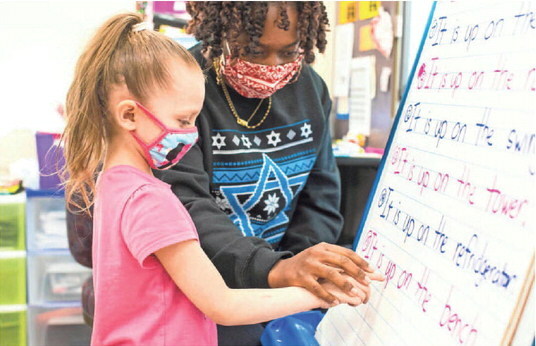ICYMI Middletown Leader to Ohio Legislators: Stop Discriminating Against Students

ICYMI Middletown Leader to Ohio Legislators: Stop Discriminating Against Students
In a recent article, Cincinnati Enquirer reporter Keith BieryGolick describes his sitdown meeting with Middletown City Schools Superintendent Marlon Styles, Jr. In the Question and Answer style article, BieryGolick starts off by writing about the testimony Mr. Styles gave to Ohio legislators, how the pandemic has shaped the school year, and how Mr. Styles and his staff are educating the district’s students.

*IN CASE YOU MISSED IT*
Cincinnati Enquirer: Middletown Leader to Ohio Legislators: Stop Discriminating Against Students
In a recent article, Cincinnati Enquirer reporter Keith BieryGolick describes his sitdown meeting with Middletown City Schools Superintendent Marlon Styles, Jr. In the Question and Answer style article, BieryGolick starts off by writing about the testimony Mr. Styles gave to Ohio legislators, how the pandemic has shaped the school year, and how Mr. Styles and his staff are educating the district’s students.
To read the full article (available to subscribers), click here.
School leader offers message for lawmakers
December 30, 2020
By Keith BieryGolick, Cincinnati Enquirer
PC: Cincinnati Enquirer
Middletown superintendent wants to stop discrimination against students living in poverty
I’m a proud Black man. We don’t have to wait until Black History Month to say we have dreams.
– Marlon Styles, superintendent of the Middletown City School District, during testimony about school funding in front of the Ohio House Finance Committee on Nov. 17 Middletown’s school superintendent placed his backpack down on a conference room table. Behind him, the high school’s parking lot was mostly empty. Because of the novel coronavirus, only half the students were here. The superintendent wasn’t supposed to be here himself, but he was. He was helping out because of staffing shortages caused by COVID-19.
Marlon Styles wore a purple mask, purple shirt and purple tie. When the 42-year-old superintendent crossed his legs, more school colors peaked through.
He had on purple socks, too.
It’s been a tough year. The toughest, maybe. And Styles was trying his best to be positive.
In April, Middletown school officials cut $2 million from the district’s budget because of economic uncertainty. In August, a 9-year-old student died after a months-long battle with an illness possibly caused by complications from COVID-19. In September, a 10-year-old student died riding his bike after he was struck by a vehicle.
On Dec. 3, the high school returned to remote learning until at least January because of spiking coronavirus cases. Throughout the year, there has been civil unrest over racial injustice and questions about how safe students are at school during a pandemic.
Education is sometimes a burden, this year more than most.
Styles said he’s lost sleep worrying about students whose main goal this year has been survival, not online learning. Those are the realities that come in a district with a median household income under $40,000. Realities that come when almost all students receive free and reduced lunch rates. Realities that meant during the pandemic Styles’ staff delivered 40,000 meals a week – and sometimes laundered clothes for students.
“It’s just a different job,” Styles said. “You have more to do than just curriculum and instruction.”
If there is a silver lining to any of this, the district has paid $600,000 to give hotspots to children in the district, so they can have reliable access to the internet at home. And where entire grade levels used to share one laptop cart, Styles said every student now has an educational device they can take home.
The superintendent repeatedly referred to these challenges as opportunities. Chances for his educators to evolve and serve students in new ways.
But make no mistake, they are challenges.
It’s why Styles testified before Ohio lawmakers about overhauling education funding in November, something he’s done multiple times this year. After his testimony a few weeks ago, one representative almost yawned in his face. She believed in what he was saying, but she didn’t believe anything would change.
Another lawmaker rebuked his testimony by mentioning the district’s “D” grade on the Ohio Department of Education report card last year.
Styles said there were racist components to those rankings. Components that discriminate against students living in poverty. Components that don’t consider student growth, but instead focus on metrics such as ACT scores.
“It infuriates me,” he said.
The day after his testimony, different legislation was passed increasing the amount of money some public schools must pay to fund vouchers that parents can use to attend private school. The legislation is discriminatory and targets impoverished communities, Styles said.
The Enquirer recently spoke to Styles about the pandemic, school funding and education in 2020. Below are excerpts from that conversation, in Styles’ own words, edited for length and clarity.
Question: What’s this year been like for you as a Black leader?
A: The murder of George Floyd really rocked society here in the United States and across the world. And I thought it was my responsibility to send a message to (my students) that there’s hope. That we’re counting on our kids.
We need to do a better job as adults to make sure our kids have a better future. What we have been doing is not right. We know better, we need to do better. And now that we know better, let’s do different so kids have better opportunities. That’s my hope as a Black role model, my hope as a Black man, my hope as a Black educator, a Black leader, a Black superintendent.
My hope is that we continue to find the courage and take action – and actually put some things in place that might make some uncomfortable. And I hope one day relatively soon our Ohio legislators get it right, and they stop discriminating against our students who are living in poverty. It’s not right.
We’ve always talked about equity and we’ve talked about achievement gaps. We’ve always talked about those things, but we haven’t really done anything about them.
We need to be intentionally unequal to be sure kids are getting what they need. No matter what the color of their skin may be.
My concern is: Will we be able to find the courage to make that happen?
Q: During the pandemic, what’s that roller coaster been like? What’s been the low point for you?
A: Something that has always been present pre-pandemic has been the equity gaps that exist in this country. There are so many kids and so many people that face those on a daily basis. For some reason, it took a global pandemic to show up for us, as a society, to admit that those gaps were present.
I don’t know if that’s a low point or not, but the blessing that I find in it is that as a society we are admitting there are equity gaps. For me, the pandemic has allowed for more people to commit to doing something about the systemic inequities that so many kids face in public education, that so many people face in society. Specifically, people and kids who are brown and Black.
Q: You previously worked in the Lakota School District. Lakota is a very different district than Middletown. What was that like coming here?
A: People often ask, well, Lakota and Middletown are so different – but I say they are so similar as well.
We’ve got kids that got dreams.
In Lakota, I was able to sit in the curriculum and instruction department and focus on that, day in and day out. Large school system. At the end of the day, you’re trying to create educational opportunities for kids.
I came to Middletown, and it’s just a different job. You have more to do than just curriculum and instruction.
Q: Access to Wi-Fi, that has to be one of your biggest challenges, right?
A: We knew some families didn’t have it. We knew some families had it, but may possibly need to stop paying for the internet to keep the house afloat. So we wanted to relieve those stressors from our community, and just let them know that we will provide whatever it is you need so you have access to learning during this global pandemic and beyond.
In my opinion, if we continue to lead because of what we are experiencing in the global pandemic, you are putting temporary solutions in place to get you through a pandemic, but you’re not really modernizing how you are educating kids. You are not really modernizing how you are educating kids in how they want to be educated.
That’s the true definition of equity.
Some would say the virtual option should just be present to get us through the pandemic. Our mindset, here in Middletown, is we’re asking the question: How do we keep that virtual option on the table next year and beyond?
It should become a staple in our service model. Kids should now have an option, a choice to come to school in person – or whatever this new model of online/virtual might look like.
Q: What do you think about the perception of Middletown from outside the district?
A: We have transitioned away from wondering what people are saying about us to embracing the ownership and responsibility of writing a narrative that is about positively believing in our kids and serving them.
So to answer your question, I don’t know what they’re saying. I don’t know what the perception may be. I can tell you what we stand for, what we’re doing and that’s the narrative we’re writing.
To read the full article, click here.



